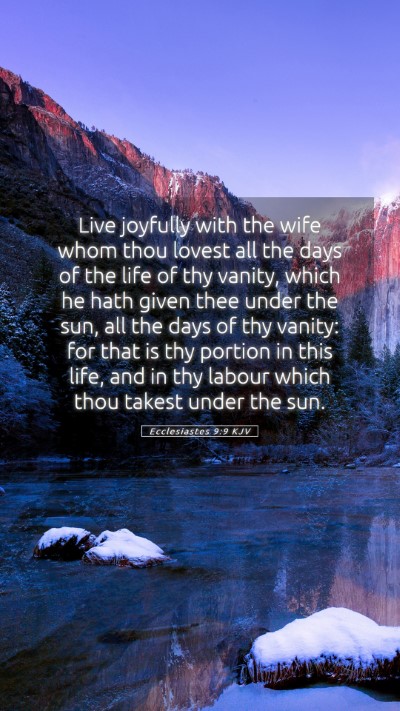Ecclesiastes 9:9 - Bible Verse Meanings and Interpretations
Ecclesiastes 9:9 states: “Enjoy life with your wife, whom you love, all the days of this meaningless life that God has given you under the sun—all your meaningless days. For this is your lot in life and in your toilsome labor under the sun.” This verse explores themes of love, the fleeting nature of life, and the importance of finding joy amidst life's troubles.
Bible Verse Explanation
By examining Ecclesiastes 9:9, we delve into the essence of enjoyment and relationships, particularly the marital bond. The emphasis is on appreciating the gifts that life brings—even in the context of its apparent futility. Below are insights from various public domain commentaries that provide deeper understanding:
Insights from Commentaries
-
Matthew Henry: Henry insists that delighting in relationships, especially with a spouse, is a divine command. He notes that life is transient, filled with struggles, yet it is essential to cultivate joy and love within the relationships God grants us.
-
Albert Barnes: Barnes remarks on the notion of “meaningless life,” interpreting it as an acknowledgment of the human experience filled with hardship. However, he emphasizes the importance of marital love as a source of fulfillment against life's backdrop, encouraging believers to embrace joy amid labor.
-
Adam Clarke: Clarke elaborates on the “meaningless days” from a perspective of labor and toil. He notes that although earthly endeavors often feel futile, the pursuit of love and happiness provides purpose. Clarke encourages readers to value personal relationships deeply as a counterbalance to life's challenges.
Understanding the Context
This verse is part of a broader narrative in Ecclesiastes, which wrestles with the themes of vanity and meaning in life. The author, traditionally attributed to Solomon, presents a somber view of existence while advocating for a balanced approach that includes both hard work and fulfilling relationships. This nuanced understanding allows us to appreciate the moments of joy amidst our toils.
Key Themes in Ecclesiastes 9:9
- The Value of Relationships: Life's meaning is often found in the connections we nurture.
- Joy Amidst Struggle: Even with life's difficulties, we are called to rejoice in what we have.
- Temporal Nature of Life: Recognition of life's brevity prompts us to prioritize what truly matters.
Applying the Verse to Daily Life
For many, the implications of Ecclesiastes 9:9 serve as a reminder to invest time in relationships and to seek joy in every circumstance. Here are practical applications:
- Foster Connections: Focus on strengthening bonds with loved ones, especially your spouse.
- Practice Gratitude: Regularly reflect on the blessings within your life, despite challenges.
- Seek Balance: Strive to find balance between work and personal enjoyment.
Bible Cross References
Understanding Ecclesiastes 9:9 can also benefit from considering related scriptures that echo its themes:
- Genesis 2:18: “It is not good for the man to be alone. I will make a helper suitable for him.”
- Ecclesiastes 3:12-13: “I know that there is nothing better for people than to be happy and to do good while they live.”
- Songs of Solomon 8:6-7: “For love is strong as death, jealousy as cruel as the grave.”
Conclusion
Ecclesiastes 9:9 reminds us to embrace the blessings of companionship amidst the struggles of life. By engaging in meaningful relationships and finding joy, we counteract the sense of futility often felt in our earthly existence. The interpretations from various commentaries deepen our understanding, encouraging believers to approach life's transience with grace and gratitude.


